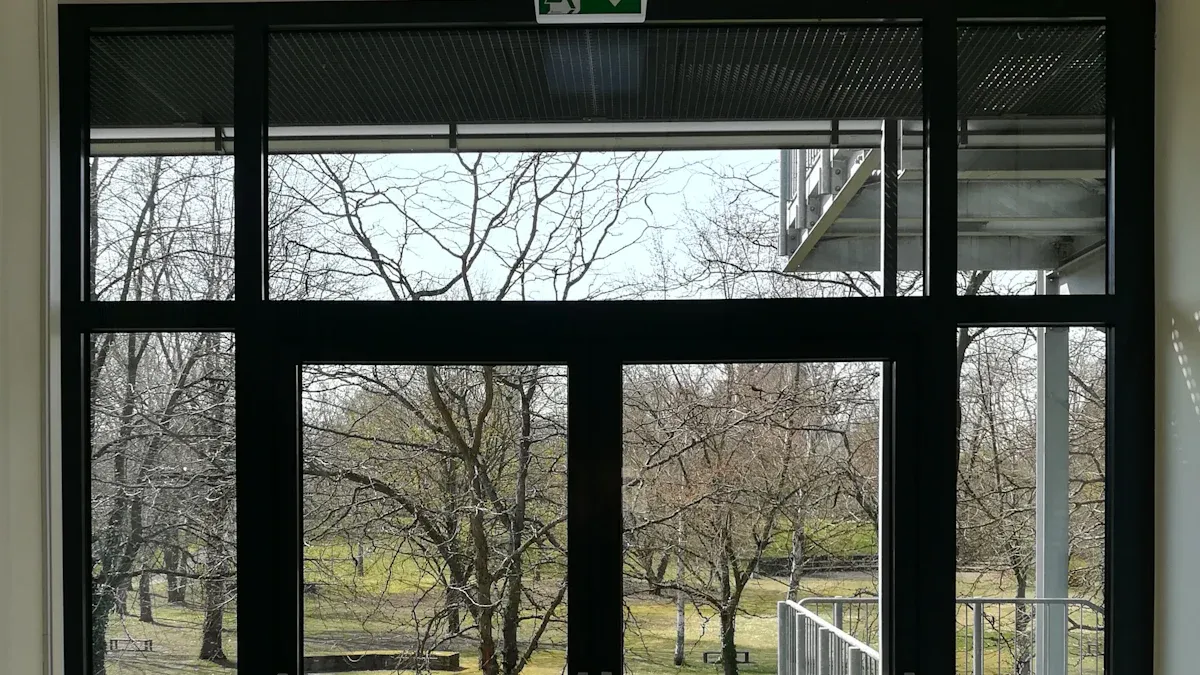
An Automatic Sliding Door Operator opens and closes doors without touch. People enjoy hands-free entry at home or work. These doors boost accessibility and convenience, especially for those with mobility challenges. Businesses and homeowners choose them for safety, energy savings, and easy movement, making daily routines smoother for everyone.
Key Takeaways
- Automatic sliding door operators open and close doors without touch, making entry easy and safe for everyone, especially people with mobility challenges.
- These systems save energy, improve security, and offer smart features like sensors and remote monitoring to keep spaces efficient and secure.
- Choosing the right operator depends on door size, traffic, and environment; professional installation and regular maintenance ensure long-lasting, smooth operation.
What Is an Automatic Sliding Door Operator?
An Automatic Sliding Door Operator is a smart device that opens and closes sliding doors without anyone needing to touch them. People see these systems in places like hospitals, stores, airports, and even homes. They use motors, sensors, and control units to move doors smoothly and quietly. These operators help everyone, especially those with mobility challenges, move through spaces with ease.
How Automatic Sliding Door Operators Work
Automatic Sliding Door Operators use a mix of technology and engineering. When someone approaches, sensors notice their presence. The system sends a signal to a motor, which slides the door open. After the person passes, the door closes automatically. This process happens in seconds, making entry and exit fast and simple.
Industry experts describe these operators as electromechanical systems. They include motors, control units, sensors, and drive mechanisms. The system can handle different door sizes and weights. Some models, like the BF150 Automatic sensor glass sliding door operator, use a slim motor to let doors open fully, even in tight spaces. Many operators connect with access control systems, such as RFID cards or biometric scanners, for added security. Newer models even offer IoT connectivity for remote monitoring and smart building integration.
Tip: Automatic sliding doors can adjust their opening speed and behavior based on how busy the area is. This helps save energy and keeps people moving smoothly.
Core Components and Safety Sensors
Every Automatic Sliding Door Operator has several important parts:
- Motor and Drive System: Moves the door open and closed.
- Control Unit: Acts as the brain, telling the door when to move.
- Sensors: Detect people or objects near the door.
- Guide Rails and Carriers: Help the door slide smoothly.
- Weatherstripping: Keeps out drafts and dust.
Safety sensors play a big role. The simplest sensor uses a light beam across the doorway. If something breaks the beam, the door stops or reopens. Many systems use infrared or radar sensors for better accuracy. Some combine microwave and infrared technology to spot people or objects quickly. These sensors help prevent accidents by stopping the door if someone is in the way.
The ANSI A156.10 standard sets rules for sensor placement and detection zones. For example, sensors must cover the full width of the door and detect objects at certain heights. This keeps everyone safe, from kids to adults. Regular checks and cleaning keep sensors working well.
| Specification Aspect | Details |
|---|---|
| Door Weight Capacity | Up to 300 lbs (200 kg) per active leaf (single slide) |
| Operating Temperature Range | -35°F to 122°F (-30°C to 50°C) |
| Clean Room Compatibility | Suitable for Class 1 clean rooms |
| Emergency Breakaway Features | Doors can swing out in emergencies, with adjustable pressure |
| Compliance Standards | Meets ANSI/BHMA 156.10, UL 1784 |
Key Benefits for Everyday Spaces
Automatic Sliding Door Operators bring many advantages to daily life:
- Hands-Free Access: People can enter and exit without touching the door. This is great for hygiene and convenience.
- Improved Accessibility: Wheelchair users, parents with strollers, and people carrying items move easily through doors.
- Energy Efficiency: Doors open only when needed, helping keep indoor temperatures steady and saving on energy bills.
- Enhanced Security: Integration with access control systems keeps spaces safe. Only authorized people can enter.
- Smart Features: Some operators use AI to predict traffic flow and adjust door behavior. This keeps things running smoothly in busy places.
Businesses and public spaces see big improvements in customer satisfaction and workflow. Hospitals use these doors to reduce contamination risks and help patients move around. Retail stores notice better energy savings and happier shoppers. Even at home, these systems make life easier for everyone.
Note: The BF150 Automatic sensor glass sliding door operator stands out for its slim design and flexible installation. It fits well in both modern homes and busy commercial spaces, offering reliable hands-free access.
Automatic Sliding Door Operators have become a key part of modern buildings. Their ability to blend convenience, safety, and smart technology makes them a top choice for many environments.
Choosing and Using an Automatic Sliding Door Operator

Types and Features
Automatic sliding door operators come in several types, each designed for different needs. People often see sliding, swinging, folding, and revolving doors in public spaces. Sliding doors are the most popular in retail, healthcare, and industrial settings because they save space and improve energy efficiency. Operators for these doors use advanced sensors, motors, and control panels to make sure the doors open and close smoothly.
Some operators use low-energy motors. These open and close the door slowly and stop right away if something blocks the path. Power-assist operators help people open heavy doors with less effort. Many systems now include smart features like AI-powered sensors, remote monitoring, and integration with building management systems. These features help with predictive maintenance and energy savings.
Here is a quick look at some key features and trends:
| Feature/Trend | Description |
|---|---|
| AI and Smart Sensors | Predictive maintenance, energy optimization, and improved safety |
| Remote Monitoring | Control and check door status from a phone or computer |
| Access Control Integration | Use keypads, cards, or biometrics for secure entry |
| Energy Efficiency | Doors open only when needed, saving heating and cooling costs |
| Compliance | Meets ADA and safety standards for public spaces |
Tip: The BF150 Automatic sensor glass sliding door operator stands out for its slim motor and flexible design. It fits well in both homes and busy commercial spaces, offering full door opening even in tight spots.
Selecting the Right Operator for Your Space
Choosing the best automatic sliding door operator depends on several factors. People need to think about the size and weight of the door, how often it will be used, and where it will be installed. For example, heavy doors in factories or warehouses may need a stronger operator, while glass doors in offices or homes can use lighter, quieter models.
Here are some important points to consider:
- Space: Limited space may require a telescopic sliding system, while larger areas can use linear systems.
- Traffic: High-traffic areas like hospitals or malls need durable operators that can handle frequent use.
- Environment: Indoor and outdoor locations have different needs for weather resistance and energy efficiency.
- Material: Glass doors let in more light and look modern, but may need special operators.
- Smart Features: Some operators connect to building systems for better control and monitoring.
A table can help compare space-specific factors:
| Space-Specific Factor | Description | Impact on Selection |
|---|---|---|
| Available space for door | Linear vs. telescopic system | Telescopic for tight spaces |
| Door leaf material | Glass, metal, or wood | Glass for daylight, metal for durability |
| Installation location | Inside or outside | Affects material and energy needs |
| Door weight | Light or heavy | Heavy doors need stronger operators |
Market trends show that automation, safety, and energy savings drive the choice of operators. Many hospitals and factories now use automatic sliding door operators to improve workflow and safety. For example, Palomar Medical Center and Johns Hopkins Hospital use these systems for patient rooms and emergency areas, showing the importance of choosing the right operator for each space.
Installation and Maintenance Essentials
Installing an automatic sliding door operator usually requires a professional. Proper setup ensures the door works safely and meets all regulations. Most operators can be added to existing doors if the door is strong and in good condition. The process involves mounting the motor, sensors, and control unit, then testing the system for smooth operation.
Regular maintenance keeps the door working well and extends its life. Here are some best practices:
- Clean sensors often to prevent detection problems.
- Lubricate tracks to avoid wear and jamming.
- Replace old or worn parts before they fail.
- Schedule maintenance checks at least once a year, or more often in busy areas.
- Use smart monitoring systems for real-time alerts and predictive maintenance.
A table shows common maintenance issues:
| Component | Failure Frequency (%) | Common Issues |
|---|---|---|
| Motor | 30 – 40 | Burnout, overheating, bearing wear |
| Controller | 20 – 30 | Circuit errors, interference |
| Sensors | 15 – 25 | Missed detections, false alarms |
| Track/Drive | 10 – 15 | Wear, jamming |
| Other Parts | 5 – 10 | Power loss, loose wires, panel damage |
Note: Professional installation and regular maintenance help prevent problems and keep the door safe for everyone. Many businesses choose operators like the BF150 for their reliability and easy upkeep.
Automatic sliding door operators make spaces safer, more accessible, and more efficient. With the right type, proper installation, and regular care, these systems can serve homes and businesses for many years.
Automatic Sliding Door Operator systems make life easier and safer for everyone. Many experts praise their reliability and safety, especially when installed and maintained by professionals. People can enjoy hands-free access at home or work. They should think about their needs and talk to experts for the best fit.
FAQ
How does the BF150 Automatic sensor glass sliding door operator improve accessibility?
The BF150 operator opens doors automatically. People with mobility challenges move through spaces easily. This system helps everyone enjoy hands-free entry at home or work.
What kind of maintenance does an automatic sliding door operator need?
Tip: Clean the sensors, check the tracks, and schedule yearly professional inspections. Regular care keeps the door running smoothly and safely.
Can automatic sliding door operators work with security systems?
| Security Feature | Compatible? |
|---|---|
| Keycard Access | ✅ |
| Biometric Scanners | ✅ |
| Remote Monitoring | ✅ |
Most operators connect with modern security systems for added safety.
Post time: Jun-19-2025



